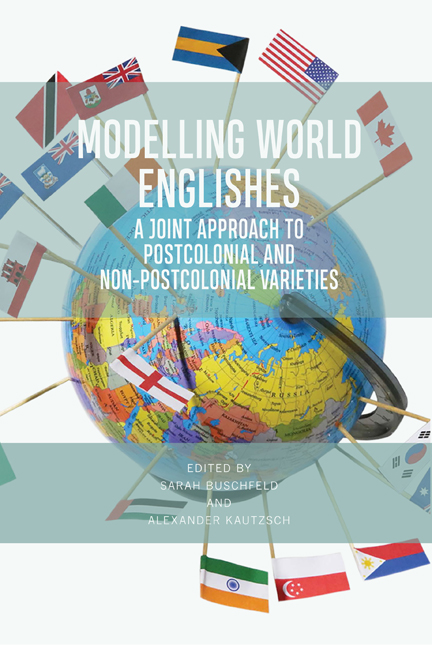Book contents
- Frontmatter
- Contents
- List of Figures and Tables
- List of Contributors
- Foreword
- 1 Introduction
- 2 English in England: The Parent Perspective
- 3 English in Namibia: Multilingualism and Ethnic Variation in the Extra- and Intra-territorial Forces Model
- 4 English in the United Arab Emirates: Status and Functions
- 5 English in India: Global Aspirations, Local Identities at the Grassroots
- 6 English in Singapore: Two Issues for the EIF Model
- 7 English in the Philippines: A Case of Rootedness and Routedness
- 8 English in South Korea: Applying the EIF Model
- 9 English in Japan: The Applicability of the EIF Model
- 10 English in Australia – Extra-territorial Influences
- 11 English in North America: Accounting for its Evolution
- 12 English in The Bahamas and Developmental Models of World Englishes: A Critical Analysis
- 13 Standard English in Trinidad: Multinormativity, Translocality, and Implications for the Dynamic Model and the EIF Model
- 14 Englishes in Tristan da Cunha, St Helena, Bermuda and the Falkland Islands: PCE, non-PCE or both? Blurred Boundaries in the Atlantic
- 15 English in Ireland: Intra-territorial Perspectives on Language Contact
- 16 English in Gibraltar: Applying the EIF Model to English in Non-Postcolonial Overseas Territories
- 17 English in Ghana: Extra- and Intra-territorial Forces in a Developmental Perspective
- 18 Synopsis: Fine-tuning the EIF Model
- Index
8 - English in South Korea: Applying the EIF Model
Published online by Cambridge University Press: 24 September 2020
- Frontmatter
- Contents
- List of Figures and Tables
- List of Contributors
- Foreword
- 1 Introduction
- 2 English in England: The Parent Perspective
- 3 English in Namibia: Multilingualism and Ethnic Variation in the Extra- and Intra-territorial Forces Model
- 4 English in the United Arab Emirates: Status and Functions
- 5 English in India: Global Aspirations, Local Identities at the Grassroots
- 6 English in Singapore: Two Issues for the EIF Model
- 7 English in the Philippines: A Case of Rootedness and Routedness
- 8 English in South Korea: Applying the EIF Model
- 9 English in Japan: The Applicability of the EIF Model
- 10 English in Australia – Extra-territorial Influences
- 11 English in North America: Accounting for its Evolution
- 12 English in The Bahamas and Developmental Models of World Englishes: A Critical Analysis
- 13 Standard English in Trinidad: Multinormativity, Translocality, and Implications for the Dynamic Model and the EIF Model
- 14 Englishes in Tristan da Cunha, St Helena, Bermuda and the Falkland Islands: PCE, non-PCE or both? Blurred Boundaries in the Atlantic
- 15 English in Ireland: Intra-territorial Perspectives on Language Contact
- 16 English in Gibraltar: Applying the EIF Model to English in Non-Postcolonial Overseas Territories
- 17 English in Ghana: Extra- and Intra-territorial Forces in a Developmental Perspective
- 18 Synopsis: Fine-tuning the EIF Model
- Index
Summary
INTRODUCTION
These ambiguities, redundancies, and deficiencies recall those attributed by Dr. Franz Kuhn to a certain Chinese encyclopedia called the Heavenly Emporium of Benevolent Knowledge. In its distant pages it is written that animals are divided into (a) those that belong to the emperor; (b) embalmed ones; (c) those that are trained; (d) suckling pigs; (e) mermaids; (f) fabulous ones; (g) stray dogs; (h) those that are included in this classification; (i) those that tremble as if they were mad; (j) innumerable ones; (k) those drawn with a very fine camel’s-hair brush; (l) etcetera; (m) those that have just broken the flower vase; (n) those that at a distance resemble flies. (Borges [1942] 1999: 231; emphasis in original)
Classification, be it of objects, behaviors, characteristics, or processes (or anything else that is remotely classifiable), is part of our human drive to understand the world and to generate knowledge. Just as the Heavenly Emporium of Benevolent Knowledge referenced above classifies animals, linguists organize and label phonemes and morphemes, distinguish between sentence types, and categorize speech acts. Variationist linguists, particularly scholars of World Englishes, identify and classify different types of Englishes. World Englishes modeling started in the 1970s with a straightforward triad paradigm model distinguishing between A-speakers (ENL), B-speakers (ESL), and C-speakers (EFL) (Strang 1970: 17–18) and has since then become so productive that it is possible to classify models of World Englishes into different types themselves. Thus, there are models based on the notion of a central member, not coincidentally the biggest grouping of models (e.g. Kachru 1985; McArthur 1987; Gorlach 1990; Mair 2013), developmental models (Schneider 2003, 2007), communicative models (Meierkord 2012), or contact-based models (Onysko 2016).
With the EIF Model by Buschfeld and Kautzsch (2017), a new method of classifying Englishes has entered the scene. This model combines the advantages of the developmental models with the contactbased and communicative ones, as contextual factors (i.e. the forces) play an essential role in the make-up of the model. This has been a long overdue advancement in the field and the edited volume at hand presents a wealth of applications to different contexts. The one introduced in this chapter is South Korea (variably referenced as Korea/South Korea in the following text), which in the past was often overlooked or classified without too much in-depth consideration (but see Rudiger 2019 for a first comprehensive account).
- Type
- Chapter
- Information
- Modelling World EnglishesA Joint Approach to Postcolonial and Non-Postcolonial Varieties, pp. 154 - 178Publisher: Edinburgh University PressPrint publication year: 2020



